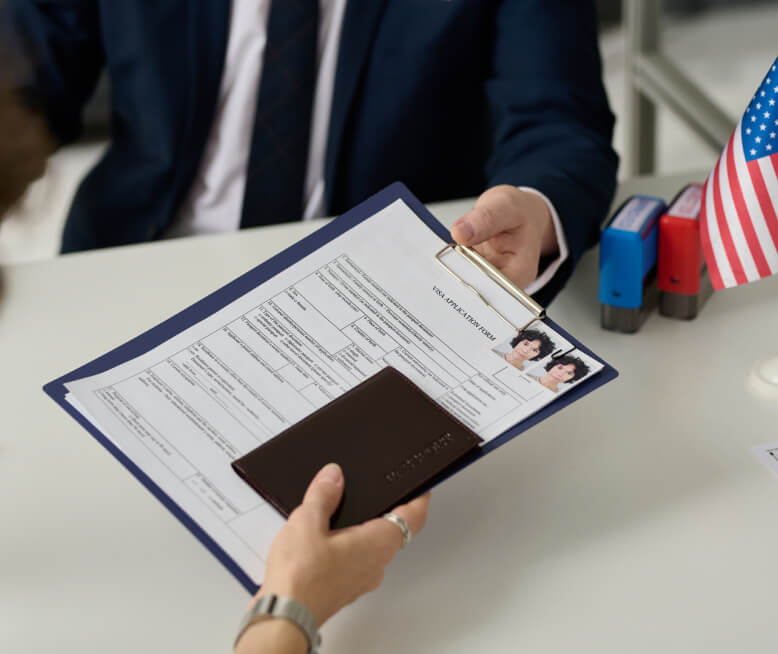For companies wanting to transfer multinational executives and managers permanently to the U.S., the EB-1C petition offers a direct path to permanent residency.
This first-preference employment-based category provides expedited processing without the need for labor certification. Our experienced EB-1C green card lawyers guide companies through each step of the green card process.
What is the EB-1C Green Card?
The EB-1C visa classification enables multinational companies to permanently transfer executives and managers from their foreign operations to their U.S. offices.
This is a first-preference employment-based category that offers key advantages:
- No labor certification (PERM process) required
- Immediate green card availability — visa bulletin is usually current for applicants of most nationalities Priority processing as a
- Option to file concurrently for permanent residency and work authorization
- Ability to include spouse and unmarried children under 21
To qualify for an EB-1C green card, the beneficiary must meet the following requirements:
- Worked abroad for at least one year in the three years before their transfer to the U.S.
- Was employed in an executive or managerial capacity at the foreign company
- Is transferring to an executive or managerial position at the U.S. entity
- The U.S. and foreign companies must maintain a qualifying relationship
- The U.S. company must have been operating for at least one year
EB-1C Green Card Application Process
The EB-1C green card process generally involves the following steps:
- Assess Eligibility: Our attorneys review the candidate’s background, position, and corporate structure to determine if the requirements for EB-1C classification are met.
- Gather Evidence: We help collect and organize documentation proving the executive or managerial role, the qualifying corporate relationship, and the U.S. company’s operations.
- File I-140 Petition: We prepare and file the Immigrant Petition for Alien Worker (Form I-140) with comprehensive supporting evidence.
- Apply for Permanent Residency: Once the I-140 is approved, the beneficiary can apply for permanent residency through Adjustment of Status (if in the U.S.) or Consular Processing (if abroad).
- Monitor Progress: We track the case through every stage and promptly address any requests for additional evidence.
EB-1C Requirements and Documentation
The EB-1C green card requires comprehensive documentation to prove three essential elements: the beneficiary’s role as an executive or manager, the qualifying relationship between the U.S. and foreign companies, and the beneficiary’s qualifying foreign employment experience.
USCIS scrutinizes each of these components carefully, requiring detailed evidence that meets specific legal standards.
Executive or Managerial Roles in the U.S. and Abroad
To qualify as an executive, the beneficiary must demonstrate that they:
- Direct the management of the organization or a major component
- Establish goals and policies
- Exercise wide latitude in discretionary decision-making
- Receive only general supervision from higher executives
To qualify as a manager, the beneficiary must show that they:
- Manage the organization, department, or subdivision
- Supervise and control other supervisory, professional, or managerial employees
- Have authority over personnel decisions
- Exercise discretion over daily operations
Evidence may include:
- Detailed job descriptions
- Organizational charts
- Personnel records of supervised employees
- Business plans and strategy documents
- Evidence of decision-making authority
- Performance reviews and evaluations
Qualifying Corporate Relationship
The U.S. and foreign entities must maintain one of these relationships:
- Parent company and subsidiary
- Affiliates owned by the same parent
- Branch offices of the same organization
Documentation of this may include:
- Corporate formation documents
- Stock ledgers
- Operating agreements
- Annual reports
- Board minutes
Qualifying Employment Abroad
The green card applicant must have worked abroad for a multinational company as an executive or manager for at least one of the three years immediately before applying. This can be documented, for example, with:
- Employment contracts and offer letters
- Payroll records
- Tax documents
Begin the EB-1C Process with De Wit Immigration Law
The EB-1C category offers companies an efficient path to secure permanent residency for their multinational executives and managers. Success requires careful documentation and strategic presentation of evidence.
At De Wit Immigration Law in Miami, we regularly represent clients in EB-1C petitions. Contact us today to discuss your company leadership’s green card needs.
Frequently Asked Questions
While both are for multinational executives and managers, the L-1A is a temporary visa issued in 1-3 year increments for a maximum 7-year stay, while the EB-1C is a first step toward permanent residency. New U.S. businesses can sponsor L-1A visas for key employees, while EB-1C is limited to companies that have operated in the U.S. for at least one year.
Yes, many executives and managers first enter the U.S. on an L-1A visa and then transition to permanent residency through the EB-1C category.
Corporate changes like mergers, acquisitions, or restructuring can impact EB-1C eligibility. It’s crucial to maintain the qualifying relationship between the U.S. and foreign entities throughout the process. Contact an immigration attorney immediately if your company undergoes any structural changes.
Yes, spouses and unmarried children under 21 may qualify for derivative green cards based on the beneficiary’s EB-1C petition. They can either apply concurrently with them or follow to join later.
If the petition is denied, we can help evaluate the reasons for the denial and explore options such as re-filing, suing USCIS in federal court, or pursuing an alternative visa category. Often, a denied petition can be successfully refiled with stronger documentation.
Whether you are a foreign investor or entrepreneur, a U.S. employer of any size, or an individual seeking to immigrate based on your talent or a close family relationship, we offer straightforward immigration strategies to advance your personal and professional goals.

-
I’m an Entrepreneur
-
I’m an Employer
-
I’m an Individual

I am extremely satisfied with the professional services provided by Jose and his team. Their profound knowledge of immigration law, coupled with exceptional customer service, ensured all my doubts and questions were promptly addressed. Highly recommended.



